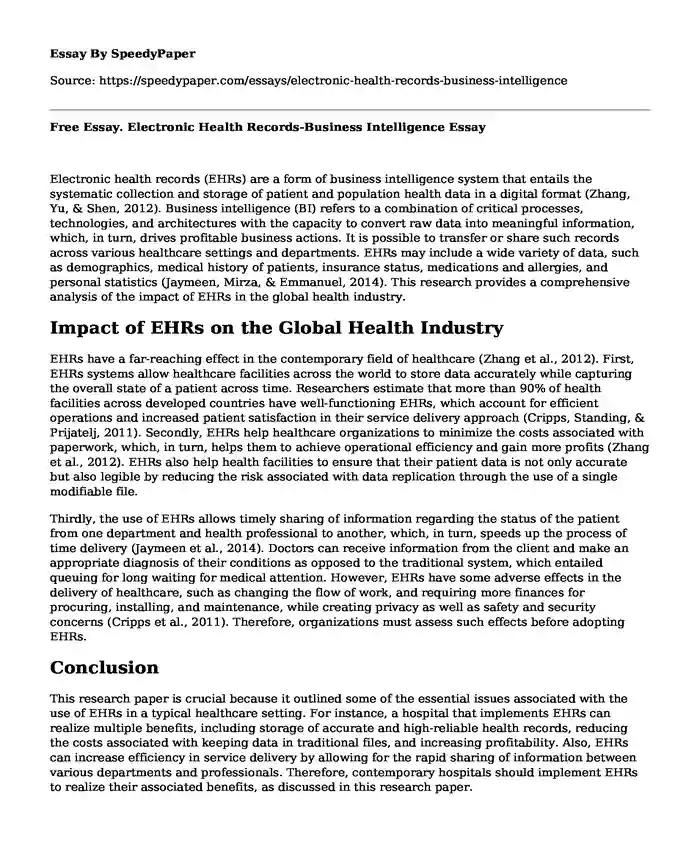
| Type of paper: | Essay |
| Categories: | Data analysis Information technologies Healthcare Community health |
| Pages: | 3 |
| Wordcount: | 590 words |
Electronic health records (EHRs) are a form of business intelligence system that entails the systematic collection and storage of patient and population health data in a digital format (Zhang, Yu, & Shen, 2012). Business intelligence (BI) refers to a combination of critical processes, technologies, and architectures with the capacity to convert raw data into meaningful information, which, in turn, drives profitable business actions. It is possible to transfer or share such records across various healthcare settings and departments. EHRs may include a wide variety of data, such as demographics, medical history of patients, insurance status, medications and allergies, and personal statistics (Jaymeen, Mirza, & Emmanuel, 2014). This research provides a comprehensive analysis of the impact of EHRs in the global health industry.
Impact of EHRs on the Global Health Industry
EHRs have a far-reaching effect in the contemporary field of healthcare (Zhang et al., 2012). First, EHRs systems allow healthcare facilities across the world to store data accurately while capturing the overall state of a patient across time. Researchers estimate that more than 90% of health facilities across developed countries have well-functioning EHRs, which account for efficient operations and increased patient satisfaction in their service delivery approach (Cripps, Standing, & Prijatelj, 2011). Secondly, EHRs help healthcare organizations to minimize the costs associated with paperwork, which, in turn, helps them to achieve operational efficiency and gain more profits (Zhang et al., 2012). EHRs also help health facilities to ensure that their patient data is not only accurate but also legible by reducing the risk associated with data replication through the use of a single modifiable file.
Thirdly, the use of EHRs allows timely sharing of information regarding the status of the patient from one department and health professional to another, which, in turn, speeds up the process of time delivery (Jaymeen et al., 2014). Doctors can receive information from the client and make an appropriate diagnosis of their conditions as opposed to the traditional system, which entailed queuing for long waiting for medical attention. However, EHRs have some adverse effects in the delivery of healthcare, such as changing the flow of work, and requiring more finances for procuring, installing, and maintenance, while creating privacy as well as safety and security concerns (Cripps et al., 2011). Therefore, organizations must assess such effects before adopting EHRs.
Conclusion
This research paper is crucial because it outlined some of the essential issues associated with the use of EHRs in a typical healthcare setting. For instance, a hospital that implements EHRs can realize multiple benefits, including storage of accurate and high-reliable health records, reducing the costs associated with keeping data in traditional files, and increasing profitability. Also, EHRs can increase efficiency in service delivery by allowing for the rapid sharing of information between various departments and professionals. Therefore, contemporary hospitals should implement EHRs to realize their associated benefits, as discussed in this research paper.
References
Cripps, H., Standing, C., & Prijatelj, V. (2011). The implementation of electronic health records: A two-country comparison. Edith Cowan University. Retrieved from: https://ro.ecu.edu.au/cgi/viewcontent.cgi?referer=https://www.google.com/&httpsredir=1&article=1429&context=ecuworks2011.
Jaymeen, S. R., Mirza, M. B., & Emmanuel, O. (2014). Electronic health records: challenges and opportunities. Journal of International Technology and Information Management, 23(3), 189-204. https://core.ac.uk/download/pdf/55335442.pdf.
Zhang, Y., Yu, P. & Shen, J. (2012). The benefits of introducing electronic health records in residential aged care facilities: A multiple case study. International Journal of Medical Informatics, 81(10), 690-704. Retrieved from: https://ro.uow.edu.au/cgi/viewcontent.cgi?referer=https://www.google.com/&httpsredir=1&article=1062&context=eispapers.
Cite this page
Free Essay. Electronic Health Records-Business Intelligence. (2023, Mar 22). Retrieved from https://speedypaper.net/essays/electronic-health-records-business-intelligence
Request Removal
If you are the original author of this essay and no longer wish to have it published on the SpeedyPaper website, please click below to request its removal:
- Statistics Essay Example
- Essay Example on Balancing Local Standardized Products Globally
- Law Essay Sample Dedicated to the Fourth Amendment
- Children's Nutrition Essay Sample
- Essay Sample about Sexual Assault Survivors in College Campuses
- Health Law - Free Essay Example
- Paper Sample on Supplemental Nutrition Assistance Program
Popular categories




